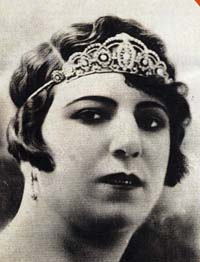Qamar-ol-Moluk Vaziri
Qamar-ol-Moluk Vaziri | |
|---|---|
 Vaziri during her early years of singing 1920's | |
| Born | Qamar Khanoum Seyed Hossein Khan قمر خانم سيد حسين خان 1905 |
| Died | 5 August 1959 |
| Occupation | singer |
| Years active | 1924-1956 |
Qamar-ol-Molouk Vaziri (Persian: قمرالملوک وزیرى) commonly known as Qamar (Arabic for moon) was a famous and beloved singer in Iran, and the first woman to sing in Iran as women when Vaziri started her career were not allowed to sing. She is known as the Queen of Persian music. She is known as the first woman in Iran to perform without a hijab in front of men.[1]
She was a popular, pioneering Persian mezzo-soprano, much revered for her mastery of the repertoire of Persian vocal music (radif-e āvāz) and her sensitive rendition of taṣnif or through-composed metered songs (taṣnif, tarāna).[2]
She is buried at Zahir o-dowleh cemetery.
Early life and career
She was born in 1905 in Takestan, Iran. Her mother died because of Typhoid fever when Ghamar was only one year and a half. She already had lost her father and therefore her grandmother was her legal guardian. Her grandmother, Molla Khayr-ol-Nesa' Khayr-ol-Zakerin (the latter was a title given to her by the king meaning "the Glory of narrators") was a Rowze-khan (Singer of soaz) in Naser-al-din Shah Qajar darbar.
She usually acompanied her grandmother in mosques and paid attention to her singing. She mentions those days one of the factors of her being a singer.[3] [4]
Her existing birth certificate, however, issued in Tehran in 1925, legally records her first name as Qamar-al-Moluk and her last name as changed from Sayyed Ḥosayn Khan to Vazirizāda, the name she chose for herself in honor of the musician and theoretician of music 'Ali-Naqi Vaziri'. [2]
Vaziri retired from singing in 1956 after over 30 years of a rich career, singing and working with famous songwriters and poets of the time such as Morteza Neydavoud, during her career she often sang for charity and for poor people in Iran.
Vaziri died in 1959 in Shemiran, Tehran. Vaziri was poor at the time as during her career she didn't earn very much.
See also
Notes
- ^ Petridis, Alexis. "Rocking the casbah: the gig of a lifetime that put Iranian women back on stage". The Guardian.
- ^ a b Nakjavani, Erik. "QAMAR-AL-MOLUK VAZIRI". Encycolpedia Iranica. Retrieved February 2, 2016.
- ^ "قمر هنرمندی بزرگ و مردمی". [Banoo Ghamarol Molooke Vaziri].
- ^ "بر ابریشم صدایش نقش هزاردستان می خواند".
External links
- QAMAR-AL-MOLUK VAZIRI, Encyclopædia Iranica
- A moon in the sky of Iranian music (BBC Persian)
- Astaneh.com audio collection of her works
- A rare photograph of Ghamar ol-Molouk: [1]
- "Aman az in Del" sang by Ghamar on Iraj Mirza's death
- A moon became the sun Publisher Ketab Co. 2015
